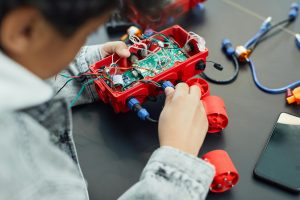How to plan a project that will be a great electronics adventure
The world of electronics can be an exhilarating and fulfilling field to explore. With endless possibilities and constantly evolving technology, it’s no surprise that many people want to embark on their own electronics adventure by planning and executing their own project. However, with so much information and resources available, it can often be overwhelming and daunting to know where to begin. In this article, we will guide you through the process of planning a project that will not only be a great electronics adventure but also a successful one.
Understand Your Goals
Before diving into the nitty-gritty details of planning your project, it’s crucial to have a clear understanding of your goals and what you want to achieve. Are you looking to build a functional device, improve your technical skills, or simply have fun tinkering with electronics? Knowing your objectives will help you decide on the scope and complexity of your project.
Gather Information and Do Your Research
The key to any successful project is knowledge. Take the time to research different electronics projects, components, and techniques. Join online forums and communities, read articles and watch tutorials, and even attend workshops or classes if necessary. This will give you a better understanding of the subject matter and help you plan your project more effectively.
Set a Realistic Timeline
It’s easy to get carried away with ideas and excitement when planning a project. However, it’s essential to set a realistic timeline for your project to avoid feeling overwhelmed or discouraged. Consider the scope, complexity, and your own skill level when setting a deadline. It’s better to give yourself more time and finish your project successfully than rushing and risking a failed attempt.
Make a Detailed Plan
Now that you have a clear understanding of your objectives, have gathered information, and set a realistic timeline, it’s time to make a plan. Start by listing all the components and materials you will need, along with their costs and where to source them. Next, create a step-by-step outline of the project, including any testing or troubleshooting procedures. Having a detailed plan will not only keep you organized but also help you identify any potential roadblocks before starting your project.
Consider Your Budget
Electronics can be an expensive hobby, and it’s essential to have a budget in mind when planning your project. Once you have a detailed plan, go through it and make adjustments to fit your budget. Consider alternatives for expensive components or materials and prioritize the most critical elements of your project. Remember, a successful project doesn’t have to break the bank.
Prepare Your Workspace
Having a dedicated and organized workspace is crucial for any electronics project. Make sure that you have a safe and well-ventilated area to work in and proper tools and equipment. Keep your workspace clean and tidy to prevent any accidents or damage to your project. It’s also helpful to have a notebook or a digital file to document your progress and any modifications made.
Be Patient and Persistent
Building and executing a successful electronics project takes time, patience, and persistence. It’s normal to face challenges and make mistakes along the way, so don’t get discouraged. Take breaks when needed, and don’t be afraid to ask for help from fellow enthusiasts or professionals. Remember, it’s an adventure, and the journey is just as important as the destination.
Conclusion
Planning a project that will be a great electronics adventure requires dedication, research, and a clear understanding of your goals. With proper preparation, a realistic timeline, and a detailed plan, you can embark on a fulfilling and successful journey into the world of electronics. Remember to stay persistent, be patient, and enjoy the process, and you’ll have a fantastic project to show for your efforts.










